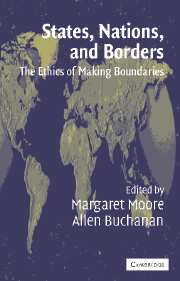Book contents
- Frontmatter
- Contents
- About the Contributors
- Acknowledgments
- 1 Introduction: The Making and Unmaking of Boundaries
- THE JEWISH TRADITION
- THE CONFUCIAN TRADITION
- THE CHRISTIAN TRADITION
- THE NATURAL LAW TRADITION
- THE ISLAMIC TRADITION
- 10 Political Boundaries and Moral Communities: Islamic Perspectives
- 11 The Unbounded Law of God and Territorial Boundaries
- THE LIBERAL TRADITION
- THE INTERNATIONAL LAW TRADITION
- CONCLUSION
- Index
11 - The Unbounded Law of God and Territorial Boundaries
Published online by Cambridge University Press: 24 November 2009
- Frontmatter
- Contents
- About the Contributors
- Acknowledgments
- 1 Introduction: The Making and Unmaking of Boundaries
- THE JEWISH TRADITION
- THE CONFUCIAN TRADITION
- THE CHRISTIAN TRADITION
- THE NATURAL LAW TRADITION
- THE ISLAMIC TRADITION
- 10 Political Boundaries and Moral Communities: Islamic Perspectives
- 11 The Unbounded Law of God and Territorial Boundaries
- THE LIBERAL TRADITION
- THE INTERNATIONAL LAW TRADITION
- CONCLUSION
- Index
Summary
Debates on the proper balance in Islamic theology between political boundaries and moral communities are premised on assumptions that are rarely made exact or explicit. The issue of whether political boundaries are necessary to protect and safeguard moral communities is formulated in the Islamic tradition in terms of whether God's morality must necessarily be actualized through a political community dedicated to fulfilling this morality. If God's morality is expressed through a set of laws, the question becomes: Does God's law need a political community and a plot of land in which it has jurisdiction and sovereignty? Is it possible to give effect to God's moral imperatives without achieving sovereignty over a piece of land that grants God's law full dominion? The problem that plagues these debates is what may be called competing comprehensive views about the nature and role of Shari'ah and its relation to political and moral communities.
There is no doubt, as Sohail Hashmi and Rashid Rida point out, that the Qur'an and Sunna exhibit considerable hostility to the ethos of blind loyalty to a tribe, clan, family, or even a piece of land. The Qur'an, for instance, commands Muslims to commit themselves to justice, even if that means being forced to testify against their own families, clans or tribes. It also condemns the moral corruptness of blind loyalty to ancestoral practices, and calls such loyalties the “cant of ignorance (hamiyyat al-jahiliyyah).” Significantly, Islamic theological doctrine has consistently claimed moral superiority over normative systems that are based on loyalty to a king, to an institution (such as a church), or to ethnic or racial affiliations.
- Type
- Chapter
- Information
- States, Nations and BordersThe Ethics of Making Boundaries, pp. 214 - 228Publisher: Cambridge University PressPrint publication year: 2003
- 15
- Cited by

